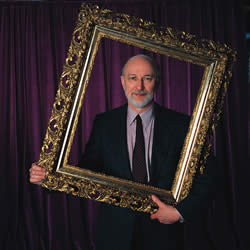
Richard Johnson

This winter, Professor Richard Johnson became the third in a series of legendary professors to deliver the popular UWAA History Lecture Series. The sold-out lectures told the story of the American Revolution through the eyes of Benjamin Franklin, John Adams and Thomas Jefferson. In a letter recommending Johnson's nomination for a teaching award, History Chair John Findlay compared Johnson to the series' predecessors. "Is Johnson better than Bridgman? Were the 1999 Yankees better than the 1927 Yankees? Audiences and students speak about Professor Johnson just as glowingly as they have spoken about Professor Jon Bridgman and, before him, Professor Giovanni Costigan."
Putting yourself in another's place and making connections is what history is about, according to Johnson. As a young graduate student from England who had studied medieval history at Oxford and found himself at Berkeley in the 1960s, Johnson put himself in the place of American students and connected that experience to his British roots.
"Being at Berkeley during those rather exciting times made me interested in the growth of political society, the achievement of political stability, and those kinds of themes," he says. "I was surprised to find American students so wrapped up in politics, but, of course, it was an extraordinary time, and Berkeley was very much the center of the political world in those days." Johnson was struck by how seriously Americans took their citizenship and how they always drew upon their revolutionary past to legitimize and analyze the present.
And so he became one of the few people not of American extraction to specialize in the study of American colonial history. "American history is an extraordinary story and one that has enormous impact on the development of the world today," Johnson says.
While he was at Berkeley, a movement to study history from the viewpoint of ordinary people of the time was emerging. Johnson adopted the new methods of social history, and is an outspoken proponent of looking at history from a multi-cultural viewpoint. His courses incorporate material on Indians, farmers, women, African Americans, Hispanics, and other people often overlooked in textbooks.
Johnson runs a slightly more formal, less democratic classroom than many of his peers, but is known for his dry humor. "Part of my curiosity about the past is always for the human stories, the slightly ironic anecdotes," Johnson explains. "I find that they work in teaching. They contribute to a useful and sociable atmosphere conducive to learning. And cheerfulness keeps breaking in."
He recalls one lecture he was giving about the Great Awakening, a religious revolution in colonial America. Right at the moment when he was talking about itinerant ministers, someone shouted from the back of the classroom, "Jesus is coming to campus on Wednesday!" Johnson used the well-timed outburst, linking the comment to his lecture. "Being able to call upon things as they develop, sometimes unexpectedly, and even to make parallels with contemporary situations is something that remains a source of satisfaction to me," he says.
"I want to push students to take full advantage of their time here," Johnson remarks. He hopes students realize that the skills they acquire in college will be useful to them in their development as individuals. "I'm committed to the study of history as a wonderful way of communicating those skills."
As for the rest, Johnson says, "I have a lot of sympathy for people who have to teach less-interesting subjects."
- Beth Luce
- Return to: Gallery of Distinction Main Page
- Return to: June 2003 Table of Contents